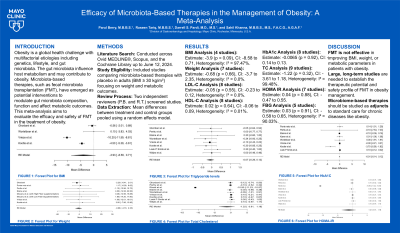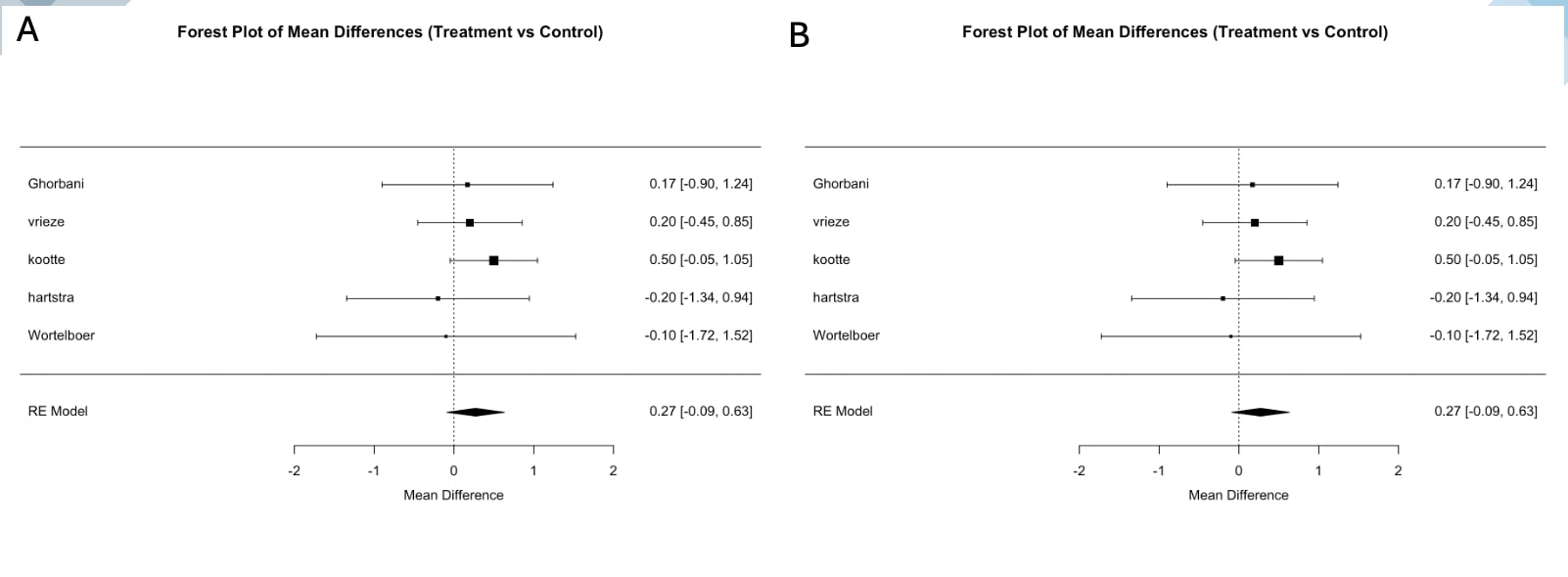Monday Poster Session
Category: Obesity
P3173 - Efficacy of Microbiota-Based Therapies in the Management of Obesity: A Meta-Analysis
Monday, October 28, 2024
10:30 AM - 4:00 PM ET
Location: Exhibit Hall E

Has Audio

Parul Berry, MBBS
Mayo Clinic
Rochester, MN
Presenting Author(s)
Parul Berry, MBBS, Raseen Tariq, MBBS, Darrell S. Pardi, MD, MS, Sahil Khanna, MBBS, MS
Mayo Clinic, Rochester, MN
Introduction: Obesity is a global health challenge with multifactorial etiologies including genetics, lifestyle, and gut microbiota. The gut microbiota influence host metabolism and may contribute to obesity. Microbiota-based therapies, such as fecal microbiota transplantation (FMT), have emerged as potential interventions to modulate gut microbiota composition, function and affect metabolic outcomes. This meta-analysis aims to evaluate the efficacy and safety of FMT in the treatment of obesity.
Methods: A comprehensive literature search was conducted across multiple databases, including Ovid MEDLINE(R), Scopus, and Cochrane Library, from inception up to 12 June 2024. Randomized controlled trials (RCTs) and observational studies assessing the impact of FMT on obesity-related outcomes were included. Primary outcomes included changes in body mass index (BMI), weight, and metabolic parameters. Data were extracted and pooled using random-effects models using R. Heterogeneity and publication bias were assessed using I² statistics and Egger’s test.
Results: A total of 14 RCTs including 578 participants were included. FMT was not associated with a reduction in weight in six studies (mean difference: -0.37 kg; 95% CI: -2.36 to 1.62; I^2:69.22%). There was no significant change in BMI in five studies where BMI was reported (mean difference:0.27 kg/m²:95% CI: -0.09 to 0.63 kg/m²: I²=0%). Where reported, no significant change in triglycerides, total cholesterol, low-density lipoprotein cholesterol, high-density lipoprotein cholesterol, fasting plasma glucose, Homeostasis model assessment-estimated insulin resistance score and fasting insulin levels was observed post-FMT.
Discussion: FMT is not effective in improving BMI, weight or metabolic parameters in patients with obesity. Large and long-term studies are warranted to fully establish the therapeutic potential and safety profile of FMT as a potential therapy in obesity management. Standardized protocols and donor selection criteria need to be refined to optimize outcomes. Microbiome-based therapies should be studied as adjunct to standard of care for chronic diseases like obesity.

Disclosures:
Parul Berry, MBBS, Raseen Tariq, MBBS, Darrell S. Pardi, MD, MS, Sahil Khanna, MBBS, MS. P3173 - Efficacy of Microbiota-Based Therapies in the Management of Obesity: A Meta-Analysis, ACG 2024 Annual Scientific Meeting Abstracts. Philadelphia, PA: American College of Gastroenterology.
Mayo Clinic, Rochester, MN
Introduction: Obesity is a global health challenge with multifactorial etiologies including genetics, lifestyle, and gut microbiota. The gut microbiota influence host metabolism and may contribute to obesity. Microbiota-based therapies, such as fecal microbiota transplantation (FMT), have emerged as potential interventions to modulate gut microbiota composition, function and affect metabolic outcomes. This meta-analysis aims to evaluate the efficacy and safety of FMT in the treatment of obesity.
Methods: A comprehensive literature search was conducted across multiple databases, including Ovid MEDLINE(R), Scopus, and Cochrane Library, from inception up to 12 June 2024. Randomized controlled trials (RCTs) and observational studies assessing the impact of FMT on obesity-related outcomes were included. Primary outcomes included changes in body mass index (BMI), weight, and metabolic parameters. Data were extracted and pooled using random-effects models using R. Heterogeneity and publication bias were assessed using I² statistics and Egger’s test.
Results: A total of 14 RCTs including 578 participants were included. FMT was not associated with a reduction in weight in six studies (mean difference: -0.37 kg; 95% CI: -2.36 to 1.62; I^2:69.22%). There was no significant change in BMI in five studies where BMI was reported (mean difference:0.27 kg/m²:95% CI: -0.09 to 0.63 kg/m²: I²=0%). Where reported, no significant change in triglycerides, total cholesterol, low-density lipoprotein cholesterol, high-density lipoprotein cholesterol, fasting plasma glucose, Homeostasis model assessment-estimated insulin resistance score and fasting insulin levels was observed post-FMT.
Discussion: FMT is not effective in improving BMI, weight or metabolic parameters in patients with obesity. Large and long-term studies are warranted to fully establish the therapeutic potential and safety profile of FMT as a potential therapy in obesity management. Standardized protocols and donor selection criteria need to be refined to optimize outcomes. Microbiome-based therapies should be studied as adjunct to standard of care for chronic diseases like obesity.

Figure: A: Forest plot for BMI(p-value: 0.13)
B:Forest plot for Weight (p-value:0.7151)
B:Forest plot for Weight (p-value:0.7151)
Disclosures:
Parul Berry indicated no relevant financial relationships.
Raseen Tariq indicated no relevant financial relationships.
Darrell Pardi: AbbVie – Consultant. Applied molecular transport – Grant/Research Support. Finch – Grant/Research Support. Immunic – Consultant. Otsuka – Consultant. Pfizer – Grant/Research Support. Phantom Pharmaceuticals – Consultant. Seres – Consultant, Grant/Research Support. Takeda – Grant/Research Support. Vedanta – Consultant, Grant/Research Support.
Sahil Khanna: Ferring Pharmaceuticals, Inc. – Grant/Research Support. Finch – Grant/Research Support. Pfizer – Grant/Research Support. Probio Tech, LLC – Consultant. Rise – Consultant. Seres Therapeutics – Grant/Research Support. Takeda – Consultant. Vedanta – Grant/Research Support.
Parul Berry, MBBS, Raseen Tariq, MBBS, Darrell S. Pardi, MD, MS, Sahil Khanna, MBBS, MS. P3173 - Efficacy of Microbiota-Based Therapies in the Management of Obesity: A Meta-Analysis, ACG 2024 Annual Scientific Meeting Abstracts. Philadelphia, PA: American College of Gastroenterology.
